- Introduction to Sustainable Event Planning
- Environment Impact of Events
- The Concept of Renting versus Buying in Event Planning
- Why Renting is More Sustainable than Buying
- Environmental Benefits of Renting in Event Planning
- Future of Sustainable Event Planning: Renting Over Buying
- Conclusion
- Inspiring the Future of Event Planning through Sustainable Choices
- Frequently Asked Questions
Introduction to Sustainable Event Planning
Sustainable event planning is a trend and a necessity in the modern world. With the threat of climate change looming, every industry needs to reassess its practices to ensure a greener future. The event industry, with its large-scale operations, is no exception to this. By adopting sustainable practices, event planners can significantly reduce the environmental impact of their events.
What is Sustainable Event Planning?
Sustainable event planning refers to organizing and managing events with particular attention to their environmental impact. This includes every aspect of event planning, from the choice of venue to the materials used for decoration to waste management. Sustainable event planning seeks to minimize adverse environmental impacts while maximizing positive social and economic effects.
The Importance of Sustainability in Events
The events industry has a massive footprint. Large events can generate significant waste, consume enormous amounts of energy, and contribute to carbon emissions. The events industry can significantly reduce its environmental footprint by adopting sustainable practices. Moreover, sustainability in event planning also often leads to cost savings in the long run and can enhance the event’s reputation and its organizers in the eyes of the attendees and the wider community.
Changes in the Event Industry towards Sustainability
The event industry is undergoing a positive shift towards more sustainable practices. More and more event planners are recognizing sustainability’s importance and adopting greener practices. Whether by choosing eco-friendly venues, using recycled materials for decor, or implementing effective waste management practices, the shift towards sustainability is gaining momentum. Companies like Quest Events are leading the way by offering rental solutions that are not only high-quality and effective but also environmentally responsible.
Environment Impact of Events
Events, whether small or large, have a significant environmental impact. Understanding and mitigating this impact is crucial for transitioning to more sustainable event planning practices.
Understanding the Carbon Footprint of Events
Every event has a carbon footprint, which includes the emissions generated from energy consumption, transportation, and waste production, among other factors. It’s essential to understand the carbon footprint of an event to identify areas where emissions can be reduced.
Waste Management at Events
Effective waste management is a crucial aspect of reducing the environmental impact of events. This includes reducing waste generation, ensuring proper disposal, and encouraging recycling and composting. By implementing robust waste management practices, event planners can significantly reduce the amount of waste sent to landfills and minimize the environmental impact of their events.
The Role of Guests in Event Sustainability
Guests play a crucial role in event sustainability. By educating and engaging guests in sustainability practices, event planners can significantly enhance the green credentials of their events. Whether it’s by encouraging guests to use public transportation, recycle, or engage with digital rather than printed materials, the role of guests in promoting sustainability cannot be underestimated.
The Concept of Renting versus Buying in Event Planning
In sustainable event planning, the debate between renting and buying is crucial. Each has advantages and disadvantages, but renting often comes out on top regarding sustainability.
Definition of Renting and Buying in Event Planning
Renting refers to using items needed for an event temporarily, without ownership. In contrast, buying refers to outright purchasing items required for an event. Renting allows access to necessary items for an event without the responsibility and costs associated with ownership, maintenance, and disposal.
The Current Market Trends: Renting vs Buying
The market is gradually shifting towards renting due to its economic and environmental benefits. Renting is often considered a more flexible and cost-effective solution, particularly for one-off or infrequent events. Moreover, with the advent of companies like Quest Events, which provide creative, effective, and efficient rental solutions, the trend of renting over buying is gaining more traction within the event industry.
Why Renting is More Sustainable than Buying
Transitioning towards a more sustainable model in event planning is imperative for the longevity and ethical responsibility of the industry. One of the significant steps in this direction is opting for rentals over purchases for event needs. This section delves into the environmental and economic sustainability of renting versus buying.
Analyzing Carbon Footprint: Renting vs Buying
The carbon footprint of an event significantly hinges on the choice between renting and buying. When you purchase products, these items’ manufacturing, shipping, and eventual disposal contribute to carbon emissions. On the other hand, rented items, being reused multiple times, spread these emissions over many events, reducing the per-event carbon footprint. Furthermore, rental companies like Quest Events often have efficient logistics and delivery systems, minimizing the carbon footprint.
Waste Reduction through Renting
One of the critical challenges faced by the event industry is waste management. Purchasing items for one-off use invariably leads to more waste as these items are often discarded post-event. In contrast, renting items can significantly reduce the amount of waste generated as these items are returned and reused for future events. Event planners can play a pivotal role in promoting a circular economy, which is integral to sustainable event planning, by opting for rentals.
The Economic Sustainability of Renting
Beyond environmental sustainability, the economic aspect must be addressed. Renting is often a more cost-effective option, especially for one-off or infrequent events. The upfront costs of buying can be substantially higher than renting. Moreover, ownership comes with additional expenses like maintenance, storage, and disposal, which are avoided when renting. This economic sustainability benefits the event planners and creates a value proposition that can be passed on to the clients, making it an attractive option.
Environmental Benefits of Renting in Event Planning
Renting over buying is a matter of economic prudence and an environmentally conscious choice. This section delves deeper into how renting contributes to reducing the demand in manufacturing, minimizing waste production, and ultimately reducing the event’s carbon footprint.
Reduction in Manufacturing Demand
Every product manufactured carries a certain amount of environmental impact, from the extraction of raw materials to the energy consumed in production. When event planners choose to rent instead of buy, they contribute to lowering the demand for new products. Over time, reduced demand leads to reduced production, which in turn minimizes the environmental footprint of manufacturing.
Decrease in Waste Production
As reiterated, waste generation is a significant concern in events. Renting directly contributes to decreased waste production as items are returned and reused. Unlike purchased items, which may end up in landfills after a single use, rented items have a longer life cycle, promoting a more sustainable approach to resource usage.
Reduction of Event Carbon Footprint
The cumulative effect of renting over buying substantially reduces the event’s carbon footprint. Event planners can significantly lower the carbon emissions associated with their circumstances by minimizing the demand for manufacturing, reducing waste, and leveraging the efficient logistics of rental companies. This resonates well with the growing consciousness towards eco-friendly practices among clients and attendees, enhancing the event’s reputation and appeal.
Future of Sustainable Event Planning: Renting Over Buying
As the world pivots towards a more sustainable model in every sector, the event planning industry is on the cusp of significant transformation. The trajectory towards renting over buying is a discernable shift that promises a greener and more responsible event industry.
Predicted Trends in Sustainable Event Planning
The rise of sustainable awareness among consumers and businesses is driving a shift in industry practices. Renting is poised to become a norm rather than an exception. The advantages of reduced costs, minimized waste, and lower carbon footprint make renting attractive for event planners. Moreover, the transition is further facilitated by market leaders like Quest Events, which provides various rental solutions. The trend also sees a growing preference for digital solutions, local sourcing, and eco-friendly materials in event planning.
The Role of Government and Policies in Promoting Renting
Government policies and regulations are crucial in steering the industry towards more sustainable practices. Tax incentives for sustainable business practices, rules around waste management, and support for circular economy initiatives are ways the government can promote renting over buying. Moreover, industry certifications and standards around sustainability can also drive a systemic change toward renting, fostering a culture of responsibility and environmental consciousness.
Spreading Awareness and Encouraging Sustainable Practices
Education and awareness are central to promoting sustainable practices in event planning. By showcasing the success of sustainable events and the impact of renting over buying, the industry can inspire a change in behavior among event planners and clients alike. Companies like Quest Events are pivotal in spreading awareness and providing easy access to rental solutions, encouraging the industry to adopt more sustainable practices.
Conclusion
The journey towards a sustainable event industry is a collective endeavor. The shift towards renting over buying is a significant step in this direction, offering a pragmatic and practical solution to the environmental challenges of events.
The Importance of Transition to Sustainable Event Planning
Transitioning to sustainable event planning is not merely a good-to-have but a necessity in the contemporary world. The environmental benefits and cost-effectiveness make the case for sustainable event planning compelling. The practice of renting over buying stands at the core of this transition, heralding a new era of responsible and eco-conscious events.
Calls to Action for Event Planners and Attendees
The responsibility of fostering sustainability lies with both event planners and attendees. Event planners are encouraged to explore rental options, engage in waste reduction and management, and opt for eco-friendly materials. On the other hand, attendees can contribute by adhering to the sustainability practices implemented at events, providing feedback for improvement, and opting for events prioritizing sustainability.
Inspiring the Future of Event Planning through Sustainable Choices
The event planning industry is at a juncture where today’s decisions will significantly impact its future. As climate change and environmental sustainability become central concerns globally, adopting sustainable practices is no longer optional but a requisite. One of the pivotal steps in this direction is the choice between renting and buying. This section delves into how making sustainable choices, like opting for rentals, can inspire a more environmentally responsible future in event planning.
Demonstrating the Feasibility and Benefits of Sustainable Choices
Making sustainable choices in event planning is about adhering to environmental ethics and demonstrating the feasibility and benefits of such practices. By opting for rentals over purchases, event planners can significantly reduce the ecological footprint of their events while also enjoying cost savings. Showcasing these benefits to clients, attendees, and stakeholders can serve as a solid testament to the feasibility of sustainable event planning.
Leading by Example
Leadership in sustainability can foster a culture of responsible event planning. Companies like Quest Events, by providing eco-friendly rental solutions, are setting a precedent in the industry. When event planners and organizations lead by example, it creates a ripple effect, encouraging others in the industry to follow suit. Each successful sustainable event serves as a case study and an inspiration for others to emulate.
Encouraging Industry-wide Sustainable Practices
For a lasting impact, the shift towards sustainability needs to be industry-wide. This requires collective efforts from event planners, rental companies, attendees, and policymakers. Promoting the benefits of sustainable practices, sharing knowledge and resources, and advocating for supportive policies can foster an environment conducive to adopting sustainable practices across the industry.
Educating and Engaging All Stakeholders
Education and engagement are crucial for inspiring a future of sustainable event planning. This involves creating awareness among clients about the environmental impact of events and the benefits of making sustainable choices like renting. Additionally, engaging with attendees and getting their buy-in on sustainability initiatives can significantly enhance the success and impact of such efforts.
Continuous Innovation and Improvement
The journey towards a sustainable future in event planning requires continuous innovation and improvement. Learning from each event, gathering feedback, and exploring new sustainable practices and technologies are essential steps in this ongoing journey. Moreover, rental companies like Quest Events significantly drive innovation by offering creative and environmentally friendly rental solutions.
In conclusion, inspiring the future of event planning through sustainable choices is a multi-faceted endeavor. It requires a combination of leadership, education, engagement, and continuous innovation to foster a culture of sustainability in the event planning industry. Through collective efforts and a solid commitment to sustainability, the industry can look forward to a greener and more responsible future.
Frequently Asked Questions
What is Sustainable Event Planning?
Sustainable event planning involves organizing and managing events to minimize adverse environmental impacts while maximizing positive social and economic effects. This approach encompasses various aspects, such as choosing eco-friendly venues, utilizing reusable or recyclable materials, managing waste effectively, and encouraging sustainable practices among attendees and stakeholders.
How does Renting contribute to Sustainable Event Planning?
Renting significantly contributes to sustainable event planning by reducing the demand for the manufacturing of new products, minimizing waste production, and lowering the carbon footprint of events. When items are rented and reused across different events, it reduces the overall environmental impact compared to purchasing new items for each event.
What are the Economic Benefits of Renting over Buying in Event Planning?
Renting offers a more cost-effective solution, especially for one-off or infrequent events. It eliminates the need for a significant upfront investment and ongoing costs associated with ownership, maintenance, storage, and disposal. Renting also provides flexibility as it allows event planners to access a variety of items as per their changing needs without the financial burden of owning them.
How can Government Policies promote Sustainable Event Planning?
Government policies can play a crucial role in promoting sustainable event planning. Procedures such as tax incentives for sustainable practices, regulations around waste management, and support for circular economy initiatives can steer the industry towards greener practices. Moreover, government-backed certifications and standards around sustainability can encourage event planners to adopt more sustainable practices, including renting over buying.
How can I, as an Attendee, contribute to Event Sustainability?
As an attendee, you can contribute to event sustainability by adhering to the sustainability practices implemented at events, such as recycling and composting. You can also opt for digital over printed materials, use public transportation or carpooling to get to the event, and provide feedback to event organizers on their sustainability efforts. Supporting and attending events that prioritize sustainability also sends a strong message about the importance of eco-friendly practices in event planning.


